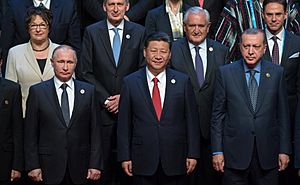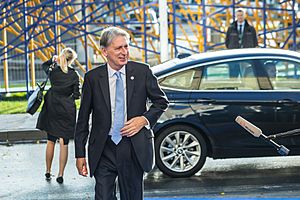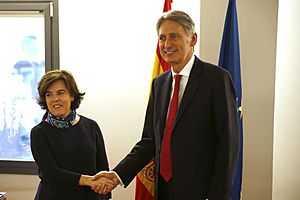Philip Hammond facts for kids
Quick facts for kids
The Lord Hammond of Runnymede
|
|||||||||||||||||||
|---|---|---|---|---|---|---|---|---|---|---|---|---|---|---|---|---|---|---|---|
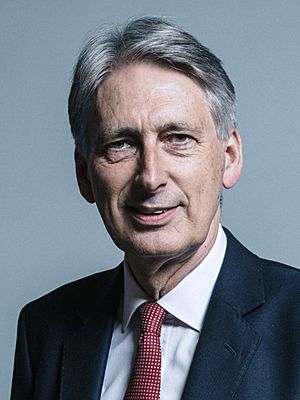
Official portrait, 2017
|
|||||||||||||||||||
| Chancellor of the Exchequer | |||||||||||||||||||
| In office 13 July 2016 – 24 July 2019 |
|||||||||||||||||||
| Prime Minister | Theresa May | ||||||||||||||||||
| Preceded by | George Osborne | ||||||||||||||||||
| Succeeded by | Sajid Javid | ||||||||||||||||||
| Secretary of State for Foreign and Commonwealth Affairs | |||||||||||||||||||
| In office 15 July 2014 – 13 July 2016 |
|||||||||||||||||||
| Prime Minister | David Cameron | ||||||||||||||||||
| Preceded by | William Hague | ||||||||||||||||||
| Succeeded by | Boris Johnson | ||||||||||||||||||
| Secretary of State for Defence | |||||||||||||||||||
| In office 14 October 2011 – 15 July 2014 |
|||||||||||||||||||
| Prime Minister | David Cameron | ||||||||||||||||||
| Preceded by | Liam Fox | ||||||||||||||||||
| Succeeded by | Michael Fallon | ||||||||||||||||||
| Secretary of State for Transport | |||||||||||||||||||
| In office 11 May 2010 – 14 October 2011 |
|||||||||||||||||||
| Prime Minister | David Cameron | ||||||||||||||||||
| Preceded by | The Lord Adonis | ||||||||||||||||||
| Succeeded by | Justine Greening | ||||||||||||||||||
|
|||||||||||||||||||
|
|||||||||||||||||||
| Personal details | |||||||||||||||||||
| Born | 4 December 1955 Epping, Essex, England |
||||||||||||||||||
| Political party | Conservative | ||||||||||||||||||
| Other political affiliations |
Independent | ||||||||||||||||||
| Spouse |
Susan Williams-Walker
(m. 1991) |
||||||||||||||||||
| Children | 3 | ||||||||||||||||||
| Residences | Send, Surrey, England | ||||||||||||||||||
| Alma mater | University College, Oxford | ||||||||||||||||||
| Signature |  |
||||||||||||||||||
Philip Hammond, also known as Baron Hammond of Runnymede, is a British politician. He was born on December 4, 1955. He held several important roles in the UK government. These included Chancellor of the Exchequer (who manages the country's money) from 2016 to 2019, and Foreign Secretary (who handles international relations) from 2014 to 2016. Before that, he was Defence Secretary (in charge of the armed forces) from 2011 to 2014 and Transport Secretary from 2010 to 2011.
Hammond was a member of the Conservative Party. He served as a Member of Parliament (MP) for Runnymede and Weybridge from 1997 until 2019. After leaving the House of Commons, he became a life peer in the House of Lords in 2020.
Contents
Early Life and Career
Philip Hammond was born in Epping, Essex, England. His father was a civil engineer. He went to Shenfield School in Brentwood, Essex. Later, he studied Philosophy, politics and economics at University College, Oxford, where he earned a top degree.
After university, Hammond worked in business. He joined a medical equipment company in 1977 and became a director. In 1984, he became a director at Castlemead Ltd, a healthcare company. He also worked in house building, property, manufacturing, and oil and gas. From 1995 to 1997, he was an adviser to the government of Malawi before he became an MP.
Early Political Steps
Philip Hammond started his political journey by leading the Conservative Association in Lewisham East for seven years, starting in 1989. He also helped Colin Moynihan, who was an MP and Minister of Sport at the time.
In 1994, he ran for MP in a special election in Newham North East but did not win. In the 1997 general election, he was elected to the House of Commons for the new area of Runnymede and Weybridge. He won by a large number of votes and stayed as the MP for that area until 2019.
In Parliament, he worked on a committee that looked at environment, transport, and regions. Later, he became a spokesperson for health, then for trade and industry, and then for local government.
After the 2005 general election, he joined the Shadow Cabinet as Shadow Chief Secretary to the Treasury. This meant he was the main opposition spokesperson for treasury matters. When David Cameron became the Conservative leader, Hammond became the Shadow Secretary of State for Work and Pensions. He later returned to his role as Shadow Chief Secretary to the Treasury.
In Government
Transport Secretary (2010–2011)
In May 2010, Philip Hammond became the Secretary of State for Transport when the new coalition government was formed. He held this job until October 2011.
One idea he considered was raising the speed limit on motorways from 70 mph to 80 mph. However, this plan was later dropped by his successor.
Defence Secretary (2011–2014)
Hammond became Secretary of State for Defence in October 2011 after Liam Fox resigned. In this role, he was part of the National Security Council, which deals with national security issues.
In December 2011, a new rule allowed women to serve on Royal Navy submarines. The first women officers started serving on Vanguard-class submarines in late 2013.
In January 2012, the Ministry of Defence reduced the number of jobs in the armed forces by 4,200. This was part of a plan to save money and make the defence budget more stable. Hammond explained that the government had to reduce the size of the armed forces but would make sure they remained strong and effective.
He also stated in February 2012 that the financial problems in the Ministry of Defence had been fixed. He said the department would no longer struggle to pay for things.
In August 2012, Hammond reduced the number of senior military positions by a quarter. This change was expected to save the Ministry of Defence about £3.8 million each year.
Before the London Olympic Games of 2012, a security company could not provide enough staff. Hammond quickly arranged for 5,000 members of the armed forces to help with security, and their work was highly praised.
Foreign Secretary (2014–2016)
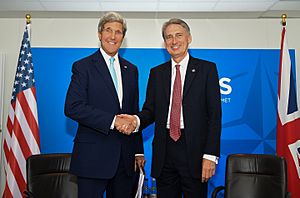
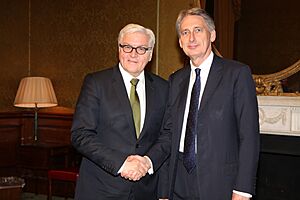
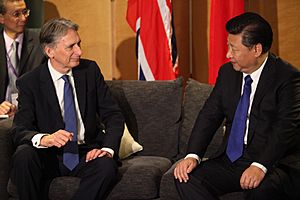
On July 15, 2014, Hammond was appointed Foreign Secretary. This role involves managing the UK's relationships with other countries. He had previously expressed that he would vote for the UK to leave the European Union unless there were changes. However, after David Cameron made some changes, Hammond supported staying in the EU during the referendum.
In March 2015, Hammond said that Britain would support the Saudi Arabian–led intervention in Yemen in every way except for direct combat. He also mentioned that the Saudi-led group had followed humanitarian laws.
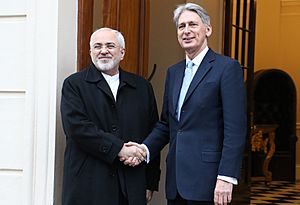
On July 8, 2015, Hammond expressed disappointment when Russia blocked a UN resolution about the Srebrenica massacre. The resolution would have called the event a genocide. Russia argued the wording was too confrontational.
On July 14, 2015, after many years of talks, a deal was reached with Iran about its nuclear program. Hammond was there as the UK's representative for this important agreement.
In October 2015, Justice Secretary Michael Gove cancelled a contract to provide services for prisons in Saudi Arabia. Hammond disagreed with this decision.
Chancellor of the Exchequer (2016–2019)
Philip Hammond was appointed Chancellor of the Exchequer by new Prime Minister Theresa May on July 13, 2016. As Chancellor, he was responsible for the UK's economy and finances.
Even though he had supported staying in the EU, Hammond confirmed he would support the UK leaving. He said it was important to protect the economy, jobs, and living standards during this process.
In his first budget in March 2017, Hammond proposed increasing National Insurance contributions for self-employed people. However, this plan was reversed a week later due to opposition.
After the 2017 general election, Hammond suggested that the government might ease up on its austerity measures (plans to reduce government spending). He said the government had heard the public's message from the election.
In October 2017, Hammond used the word "enemy" to describe the European Union's Brexit negotiators. He later expressed regret for his choice of words.
In November 2017, while discussing how new technologies like driverless cars and robots might affect jobs, Hammond made a comment about unemployment. He later clarified his remarks, acknowledging the actual number of unemployed people in the UK.
In July 2019, as Boris Johnson was expected to become prime minister, Hammond announced he would resign. He did not want to be part of a government that might pursue a "no-deal Brexit," which he could not support. He resigned on July 24, 2019.
Later Political Career
In August 2019, Hammond and other Conservative MPs wrote a letter to Prime Minister Boris Johnson. They said his approach was making it harder to get a new deal with the European Union.
On September 3, 2019, Hammond and 20 other Conservative MPs voted against Boris Johnson's government. This vote helped block Johnson's plan for a "no-deal" Brexit on October 31. As a result, all 21 MPs, including Hammond, were removed from the Conservative Party. They then sat in Parliament as independent MPs.
Hammond did not run for re-election in the 2019 general election. He later said that the Conservative Party had changed and was "not the party I joined."
In February 2020, Boris Johnson nominated Hammond for a peerage, which means he would become a member of the House of Lords. He was created Baron Hammond of Runnymede on September 30, 2020. He gave his first speech in the House of Lords on January 28, 2021.
After leaving the House of Commons, Hammond took on advisory roles in business. In July 2020, he became a paid, part-time adviser to Saudi Arabia's Minister of Finance. As of 2023, he is also the Chair of Copper Technologies, a company that deals with cryptocurrency trading.
Political Views
2008 Financial Crisis
In May 2012, Hammond said that banks were not entirely to blame for the 2008 financial crisis. He explained that people who took out loans were "consenting adults" and should also take some responsibility for their actions.
Same-Sex Marriage
In May 2012, Hammond said that same-sex marriage was "too controversial." In January 2013, he made comments that were later clarified to mean he was discussing a wide range of relationships, not just same-sex ones.
In May 2013, Hammond chose not to vote for same-sex marriage, unlike some other Cabinet Ministers. He was openly critical of how quickly the Marriage (Same Sex Couples) Act 2013 was passed. He said in November 2013 that it was "damaging" to the Conservative Party.
Public Services and Taxation
Hammond believes that everyone, not just the wealthiest, might need to pay higher taxes to fund better public services. He feels that borrowing money is not the solution. He said that if people want public services to improve, "Everybody including ordinary earners are going to have to pay more tax."
Awards and Honours
 United Kingdom:
United Kingdom:
- May 13, 2010: He became a Member of the Privy Council of the United Kingdom. This gave him the title "The Right Honourable" and the letters "PC" after his name for life.
Personal Life
Philip Hammond married Susan Carolyn Williams-Walker on June 29, 1991. They have two daughters and one son. They live in Send, Surrey, and also have a home in London. In 2009, his wealth was estimated to be around £9 million.
See also
 In Spanish: Philip Hammond para niños
In Spanish: Philip Hammond para niños
 | Ernest Everett Just |
 | Mary Jackson |
 | Emmett Chappelle |
 | Marie Maynard Daly |


